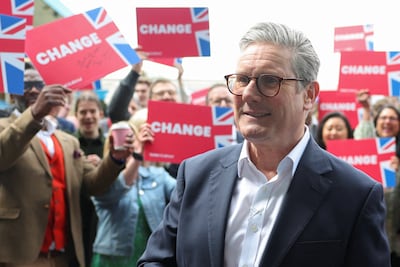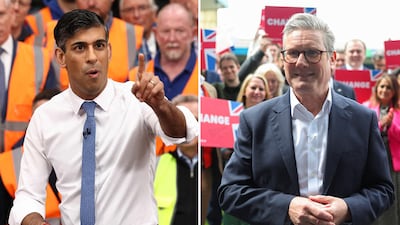Within hours of Rishi Sunak announcing that Britain will hold a general election on 4 July, an email from the opposition Labour Party arrived in hundreds of inboxes late on Wednesday afternoon. It had a one-word title: Change.
The Prime Minister had already spoken of his plans for a “secure future” for the people of the UK when the six-week general election campaign launched.
The centre of the parties' battle plans is already clear from those opening exchanges, and British voters can expect to hear much more of these terms as both sides push messages that substantially overlap.
Firing the starting gun for the election, Mr Sunak said a vote for the Conservatives was a vote for security, prudence and keeping things on an even keel. “Who do you trust to turn that foundation into a secure future for you, your family and our country?” he asked.

“I came to office above all to restore economic stability. Economic stability is the bedrock of any future success: whether that is rising wages and good jobs, investment in our public services, or the defence of the country.
“But this hard-earned economic stability was only ever meant to be the beginning. The question now is how, and who do you trust, to turn that foundation into a secure future for you, your family and our country?”
Falling inflation
Analysts said that at least one of the reasons Mr Sunak called an election for July, months sooner than was generally predicted, was the fall in the rate of inflation to 2.3 per cent in April, almost a full percentage point lower than in March and moving much closer towards the Bank of England's two per cent target.
Labour's finance spokesman
Also, the UK economic picture is looking slightly better than it did a few months ago, having emerged from the technical recession it fell into towards the end of last year. In addition this week, the IMF upgraded its outlook for the UK economy from 0.5 per cent to 0.7 per cent.
“The UK economy is approaching a soft landing, with a recovery in growth expected in 2024, strengthening in 2025,” the IMF said.
But the IMF also warned of a growing black hole in the UK's public finances, and that £30 billon will have to come from either spending cuts or tax rises in order to stabilise the national debt, no matter which political party wins a general election.

Nonetheless, Labour party leader Keir Starmer was adamant that the best way to guarantee economic stability was through change, which would “stop the chaos” inflicted on the UK after 14 years of Conservative rule, adding that the election would be “a chance to change for the better”.
“That opportunity for change is what this election is about,” Mr Starmer said.
“It's time for change. We can start to rebuild Britain, and change our country.”
'Securonomics'
In some fiscal policy areas it is difficult to see daylight between the two main political parties.
Indeed, neither would tinker further with National Insurance (NI) and Labour would not reverse Chancellor Jeremy Hunt's recent 2p cut to the tax. Likewise, neither the Conservatives nor Labour would look to increase income tax or change the bands within it, tweak capital gains tax or corporation tax.
But Labour says it will immediately scrap the non-dom tax status, something which Mr Hunt announced in his Budget in March, but in a phased manner over the longer term.
Labour will also introduce VAT on private school fees which it claims “will raise vital money needed to improve standards in stretched state schools with more teachers”.
In addition, Labour will increase the windfall tax on oil and gas companies, and create a publicly-owned energy company which will invest in clean-energy projects.

Indeed, making Britain more self-sufficient in energy and building more diverse and resilient supply chains is a cornerstone of shadow chancellor Rachel Reeves's key policy platforms, a term she coined herself: “securonomics”.
Basically, securonomics is about initialising change to bring about economic and political security by providing strategic policy direction and incentivising companies to certain areas.
It's modelled on “Bidenonomics”, essentially the economic policy of President Joe Biden, that centres on public investment, invigorating the middle class and promoting business competition. The idea is that economic growth starts with the middle class, as opposed to the 1980s Reaganomics policy which was based on so-called trickle-down economics, where wealth was created at the top of society.
“In short, Labour wants to direct business investment to areas [where] it believes the UK will have a strategic competitive advantage (eg green technology) – what could be termed modern supply side economics,” said Daniel Casali, chief investment strategist at wealth management firm Evelyn Partners.
“This is different to the traditional supply side economics championed by Margaret Thatcher more than 40 years ago where regulations were torn up to allow free markets to determine where private investment goes, through policies like privatisation and the financial markets' ‘Big Bang’.”
Ms Reeves was somewhat scathing of Mr Sunak this week when the Prime Minister appeared to take much of the credit for the fall in inflation, saying the government has done very little to “address the underlying reasons for why inflation got out of control in the first place”.
“That's why securonomics is so important, so that we build that resilience,” she said.
“So, when shocks come along we are not so exposed in the way that we found ourselves these last few years.”
No economic change
Mr Sunak offers a darker vision but one that also holds the promise of progress. In a speech in mid-May he warned on the risks facing the nation. “I feel a profound sense of urgency. Because more will change in the next five years than in the last 30,” he said. “I’m convinced that the next few years will be some of the most dangerous yet, the most transformational our country has ever known.
“Technologies like AI will do for the 21st century what the steam engine and electricity did for the 19th,” he said. “They’ll accelerate human progress by complementing what we do, by speeding up the discovery of new ideas, and by assisting almost every aspect of human life.”
Most economists are quick to point out that Labour's “change” and the Conservatives' “security” approaches will make little fundamental difference to the UK's economic outlook in the immediate post-election period.
“The general election on Thursday July 4 may usher in a new political era but it is unlikely to lead to a dramatically different economic outlook,” said Paul Dales, chief UK economist at Capital Economics. “The current fiscal constraints mean the winner will find it difficult to boost long-term economic growth.”
Labour will be banking on a British public that has had two and a half years of rising interest rates, inflation at one point topping 11 per cent and a squeeze on household budgets of a magnitude that has not been seen in generations, voting for a change in July.
UK general election campaigning – in pictures
Come what may Mr Sunak is set to claim that real living standards have been rising since last July, the labour and housing markets are proving robust, wages are edging higher and consumer confidence is far better.
And the Starmer-Reeves team will insist their “change” message is wrapped in the reality that issues of defence and security are at the root of economic ones.



























































































